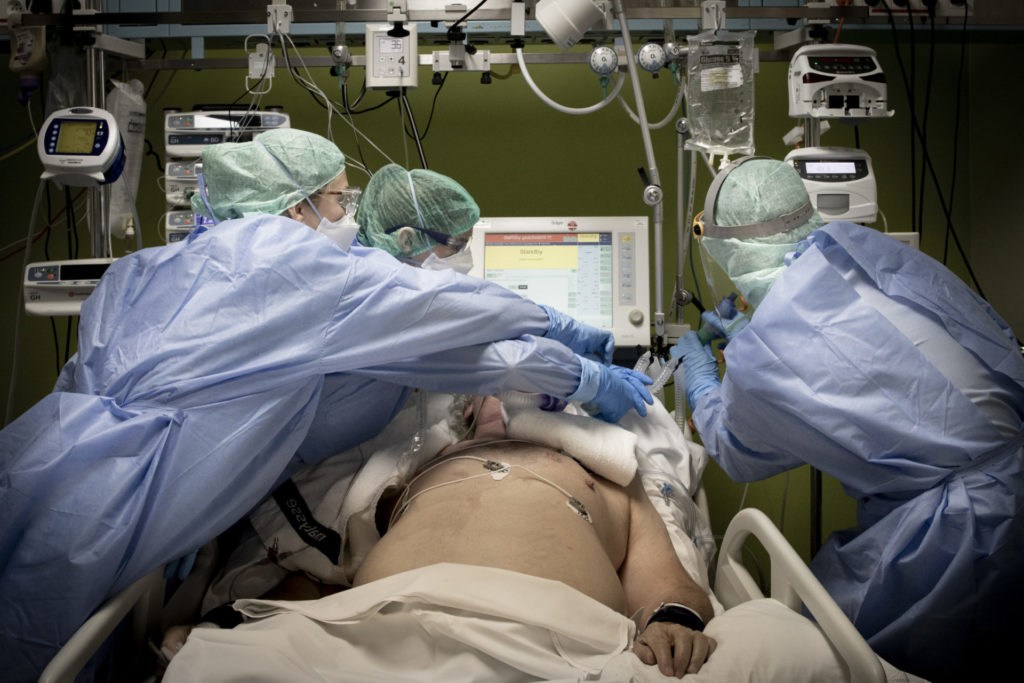The nurses of the intensive care unit of the University hospital in Brussels (UZ Brussel) have complained they have been left out in the cold during the pandemic and that the limits of what is reasonable have long been exceeded.
In an open letter published on Wednesday, the hospital staff pointed to the fact that, for the fourth time in one year and a half, there is a "new progressive increase" in the number of infections and hospitalisations, which once again especially burdens regular care.
"Currently, those lying here now are all unvaccinated, and that makes us especially angry because this situation could have so easily been avoided," Caroline Robberecht, a UZ Brussel intensive care unit nurse, told The Brussels Times.
She added that as numbers are rising, nurses find the fact that regular care is once again being pushed aside, now by people who were given the option to be vaccinated and chose not to be, particularly difficult.
"If you had asked me during the second or third wave, we could have said look, these people have not been vaccinated, it can't be their fault, but now we know that everyone has had that chance," she explained.
Robberecht added that in the past, when the epidemiological situation in hospitals got worse, her fellow nurses always mustered the courage and "did what we had to do, that's what we always do as nurses," but said that knowing it could be prevented, "makes it very difficult to motivate yourself."
"All people have a right to care, and now the non-vaccinated are taking it away from them. Ultimately, everyone pays the price for people who choose not to be vaccinated," she said.
'Missed opportunity'
In general, the nurses in the intensive care unit blame the government for not making vaccination against the coronavirus compulsory - especially in Brussels - which she argued is a "problem region."
"In my opinion, the government has missed an opportunity," Robberecht said. "We knew that to get out of this situation we had to work together because otherwise, we won't get there, and now it's a shame to see that this cooperation isn't happening."
However, according to Inge Neven, the head of the Brussels Health Inspectorate, this is a difficult matter, and mandatory vaccination for all people is a discussion that "cannot take place at the moment."
"The preparations around mandatory vaccination for care personnel are ongoing but very difficult, so it is even more difficult to implement this rule for everyone, especially from a legal point of view," she told The Brussels Times.
Robberecht recognised that most un-vaccinated people, particularly the region where the hospital is located, aren't ill-willed, but that people "often are just not informed enough about where to get vaccinated and why."
"Our hospital is going to respond to that because we know that addressing people directly that more people will get vaccinated, or at least I hope so," Robberecht added.
She stressed that, as a first step at least, proof of vaccination or recent recovery from the virus through the Covid Safe Ticket (CST) should be required for people to enter hospitals, something the umbrella organisation for Flemish hospital care also called for.
"In hospitals, people's resistance is already lowered, visitors sometimes bring unwanted things in, so this is definitely safer for our patients," she said.
"We risk our own health for our patients, and that's our choice, if you enter the nursing profession you have to do it with heart and soul, and you have to put the patient first. But patients also have to take care of themselves, and it's hard when they make a choice not to," Robberecht added.
Salt to the wound
Just as intensive care nurses were recovering from dealing with the third wave, the Federal Government announced at the end of June this year that nurses in intensive care and emergency rooms would enter a new wage system (IFIC).
Although this means newly graduated nurses will earn a higher wage, the system hardly made a difference to the wages of the more experienced nurses, which made them feel "all their efforts are not recognised and appreciated by this form of remuneration."
"We have actually been completely forgotten by the government in that classification, and that hurts. To put it very bluntly, it was rammed down our throats by this system, at a time when we really weren't ready for that," Robberecht said.
Meanwhile, according to the UZ Brussel hospital, the fourth wave has already begun.
"The staff are worried and we are actually preparing for the fourth wave; we have started that wave already and now our spirits are really sinking," Robberecht said.

